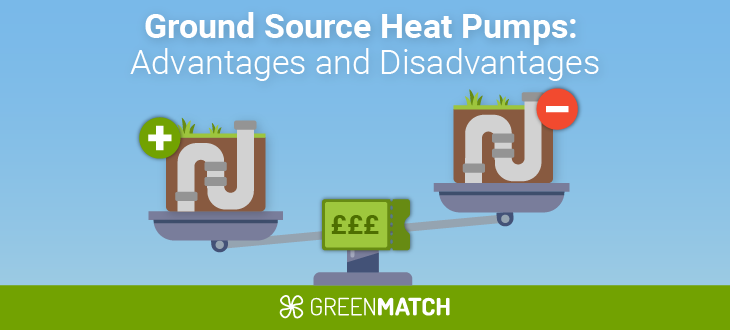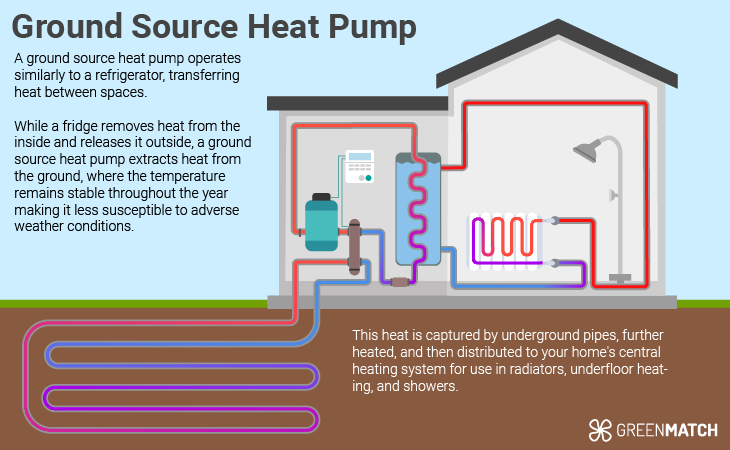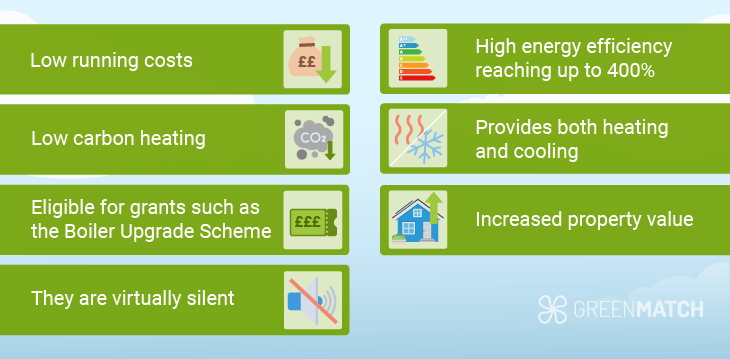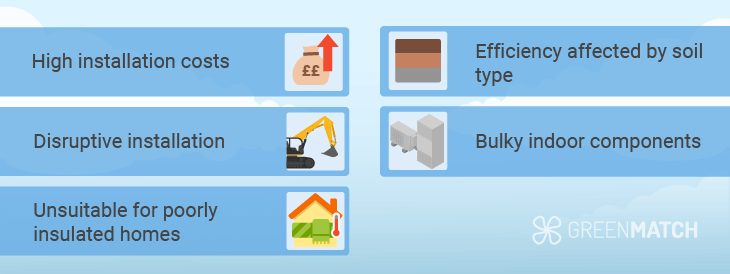Answer these simple questions and we will find you the BEST prices
Which type of solar quotes do you need?
It only takes 30 seconds
100% free with no obligation

Get up to 4 quotes by filling in only 1 quick form

Install a heat pump for less with the BUS grant

We’ve helped over 500,000 homeowners reduce their carbon footprint
- GreenMatch
- Ground Source Heat Pumps
- Pros and Cons of Ground Source Heat Pumps
Ground Source Heat Pumps: Advantages and Disadvantages


- The biggest advantages of ground source heat pumps are their remarkable efficiency rating, reaching up to 400%, and their eligibility for government grants that can save homeowners up to £7,500 through the Boiler Upgrade Scheme.
- The disadvantages of ground source heat pumps include high costs (£11,500 - £27,500) and the space they take up. Additionally, they can be noisy, especially when operating at higher fan speeds.
- Ground source heat pumps' lifespan is around 25 years, making them a worthwhile long-term investment, in addition to their efficiency and grant eligibility which can help offset initial costs.
Ground source heat pumps (GSHPs) are excellent low-carbon heating systems that are able to extract warmth from the ground by using buried pipework rather than producing it by burning fossil fuels.
In addition, once installed, ground source heat pumps can help you save up to £2,000 on your yearly energy bills, as they have low running costs. However, the initial price of a ground source heat pump is high, which can turn some homeowners away. That said, like other types of heat pumps, GSHPs are eligible for the Boiler Upgrade Scheme.
To help you determine whether a GSHP is the right choice for you, we will walk you through the ground source heat pump advantages and disadvantages in this comprehensive guide.
| Advantages | Disadvantages |
|---|---|
| Low running costs | High installation costs |
| Energy efficient | Efficiency affected by soil type |
| Low carbon heating | Disruptive installation |
| Providing cooling and healing | Unsuitable for poorly insulated homes |
| Eligible for grants | Bulky indoor components |
| Constant and inexhaustible | |
| Virtually silent | |
| Increased property use |
Before investing in a ground source heat pump, it is important to seek tailored guidance from industry professionals. GreenMatch provides a free service that allows you to compare quotes from up to 4 local heat pump installers. This non-binding option lets you explore solutions at your own pace, saving you both time and money. Click the button below to fill in our short 30-second form:
- Quotes from local engineers
- Payment by finance available
- Save £7,500 with BUS grant
It only takes 30 seconds



What is a heat pump and how does it work?
A ground source heat pump operates similarly to a refrigerator, transferring heat between spaces. While a fridge removes heat from the inside and releases it outside, a ground source heat pump extracts heat from the ground and can also provide cooling by reversing this process.
The temperature in the ground remains stable throughout the year, making GSHPs less susceptible to adverse weather conditions, in contrast to their air source heat pump counterparts. This ensures that you can enjoy consistent heating year-round. This heat is captured by underground pipes, further heated, and then distributed to your home's central heating system for use in radiators, underfloor heating, and showers.

As you can see, this eco-friendly energy system is highly versatile, acting as both a heating and cooling system. However, it also comes with some drawbacks. In the coming sections, we will outline the ground source heat pumps’ pros and cons so you can consider them before making a final decision.
Ground source heat pump advantages

- Low running costs: GSHPs boast lower running costs compared to air source heat pump running costs and electric heating systems in general. Typically, annual GSHP running costs range from £625 to £1,315 on average.
- Energy efficient: Ground source heat pumps can reach outstanding efficiency ratings of up to 400%, which is almost 4 times more efficient than the best gas boilers.
- Low carbon heating: This type of heat pump does not produce carbon emissions on site as they don’t use any fossil fuels. This makes it a great low carbon heating solution, especially if paired with solar panels that can generate renewable electricity for it to run on.
- Provides cooling and heating: Unlike air conditioners, heat pumps utilise a reversing valve to switch the fluid circulation direction for heating, eliminating the need for a separate furnace.
- Eligible for grants: Ground source heat pump grants, like the Boiler Upgrade Scheme, can save homeowners up to £7,500, reducing costs and making ground source heat pumps a more appealing investment.
- Constant and inexhaustible: Ground heat is usually constant and inexhaustible (there are almost no fluctuations in its capability for heating and cooling), is available worldwide and has a massive potential.
- Virtually silent: GSHPs operate underground; hence, they are silent runners, so you or your neighbours will not be bothered by a noisy heat pump unit.
- Increases property value: A well-designed ground source heat pump installation can boost property value by 1.7% to 3%, making it a valuable home improvement option.
Ground source heat pump disadvantages

- High installation costs: The main disadvantage of ground source heat pumps lies in their substantial initial expenses, which typically vary from £11,500 to £27,500. Including installation, costs can reach up to £49,000.
- Efficiency affected by soil type: While ground source heat pumps can be installed in sandy or clay soil, sandy soil may slightly reduce efficiency.
- Disruptive installation: Given their complex installation, GSHPs are more common for new-builds rather than for retrofits. If a property does not have a large enough garden, then a vertical ground source heat pump borehole can be installed instead, though this is more costly than a horizontal system.
- Unsuitable for poorly insulated homes: Ground source heat pumps may struggle to adequately heat poorly insulated properties, which could result in high running costs.
- Bulky indoor components: Ground source heat pumps require indoor space for components like the heat pump unit, hot water cylinder, and buffer tanks, which can be quite bulky.
Is a ground source heat pump the right choice for your home?
All in all, after considering the pros and cons of ground source heat pumps, it can safely be concluded that they are a valuable long-term investment for homeowners who are seeking to become more environmentally conscious.
GSHPs offer an impressive efficiency rating of up to 400%, boost property value by about 1.7% to 3%, and are eligible for government grants of up to £7,500, despite their significant upfront costs ranging from £11,500 to £27,500.
While better suited for new builds, GSHPs can also be a viable retrofit option, providing enhanced energy efficiency, reduced carbon footprint, and increased property value.
Of course, such a device requires a specialist to carry out the installation. The difficulties show up at the external part of the GSHP installation. It is necessary to excavate and distribute an extensive net of pipes (those that will take heat to or from the ground). Fortunately, this doesn’t generate major environmental issues.
However, you’ll need to look for a reliable GSHP installer. Instead of spending an unnecessary amount of time researching and negotiating with installers, let us help you get started in just 30 seconds. By filling in our short form, we’ll connect you with up to 4 vetted ground source heat pump installers from our professional network of suppliers free of charge and with no obligation. To get started, simply click the button below.
- Quotes from local engineers
- Payment by finance available
- Save £7,500 with BUS grant
It only takes 30 seconds



FAQ
Ground source heat pumps can reach efficiency ratings of up to 400% and can provide stable heating and cooling throughout the year, however, they do have high upfront installation costs. Despite the cons, GSHPs are a valuable long-term investment that can increase property value and are eligible for grants.
The biggest benefit of ground source heat pumps is their high-efficiency rating, reaching up to 400% compared to other heating systems, such as electric heaters and boilers.
The biggest disadvantage of ground source heat pumps is their significant upfront cost, which can range from £11,500 to £27,500.
Ground source heat pumps have a lifespan of about 25 years, making them a worthwhile long-term investment.
Yes. Ground source heat pumps can provide consistent heating throughout the year by utilising the earth’s heat during the winter. This makes them less susceptible to adverse weather conditions compared to other heating systems
Ground source heat pumps have lower running costs than other electric heating systems, typically ranging from £625 to £1,315.

Valli has been writing well researched articles about renewable energy, sustainability and green technologies for GreenMatch since 2017. Her work has been published in various media such as Entrepreneur, Business Insider, Canadian Geographic, uSwitch, and eCycle.

We strive to connect our customers with the right product and supplier. Would you like to be part of GreenMatch?

- Quotes from local engineers
- Payment by finance available
- Save £7,500 with BUS grant
It only takes 30 seconds






